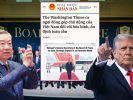
The COVID-19 pandemic has turned upside down the political, economic and social situation of the world. Particularly how changes have occurred and continue to occur in the US and affect Vietnam will be the subject of this article. First of all, we would like to present the situation in the US.
It is quite surprising that after two months May and June, the number of infected patients has increased sharply since July, causing many states to re-set social distance, but still allow the economy to be opened.
Trump has been blamed for the delay in the pandemic prevention, but it must be fair to say that Trump’s Government has tried to encourage pharmaceutical companies to quickly find vaccines before the election.
In the meantime, it is unable to close all long-term social activities, but have to learn to „live with the floods.“
Social situation in the US
Signs that the US economy will recover slower than expected in the third quarter with two effects: (i) unemployment may remain in double digits; and (ii) export orders for Vietnam and other Asian countries will remain very slow.
Experiencing a pandemic the US government learned the lesson of life and bitterness. President Trump inherited the worst inheritance he has inherited from previous presidents, including Republicans and Democrats, that is: to let US companies profit, to flee the US to China because of cheap labor. At the top of the list are pharmaceutical and medical equipment companies, more than 95% of US drugs and medical devices manufactured in China. Next are electronics companies, from sophisticated „chips“ to computers, and iPhone phones, all assembled in China.
This mistake will be boldly changed by the Trump administration: trying to reduce dependence on China and give up globalization.
The newly enacted policy requires US companies to return to the US if they do not want to be subject to very high taxes because their products are manufactured in China. The Senate also introduced detailed laws that required materials to be made in the US, in case the company avoided the law (importing materials from China, assembling them in the US, and bearing labels „Made In USA“ brand). Both Republicans and Democrats agree on this.
Two examples to lessen China’s influence: (i) Taiwan’s largest manufacturer of electronic „chips“ for computers, phones, and cars, „Taiwan Semiconductor Manufacturing Co.“ invests $12 billion dollars to build a factory in Arizona; and (ii) the US Department of Health has signed a $354 million contract with the „Phlow“ company in Virginia to produce pharmaceutical products in the US.
The wave of repatriation of American companies from China will be even faster than the past three and a half years, a positive sign for a new US economy will also be a blow to China’s economy and unemployment.
But most important is the wave of technological change. We believe that the pandemic will accelerate US technology to come online and digitize within the next 6-12 months instead of the expected 3-5 years.
The news about brick & mortar buildings closing in the US as well as branches around the world closed due to losses and no customers after during and after the epidemic (Zara, Microsoft, …) is just a sign opening a technology revolution, replacing traditional store trade with online commerce:
It is reducing the need for future shopping malls and offices due to home working facilities and video communication such as ZOOM.
The second is the role of online firms such as Amazon, Shopify, etc. which have been confirmed by stock prices rising sharply before the level of the epidemic.
Thirdly, companies like Apple and Shopify have dominated the music sector, and even emerging taxi companies from a few years like Uber and Grab will be replaced by autonomous car technology, and cars. transportation, will severely affect employment.
The US will strengthen the invention and application of artificial intelligence, and strongly apply robots in production and consumption.
We realize that the digital technology revolution will be overwhelming; the most special is the role of blockchains. This is a platform or information system that collects all the data, which can be applied in all industries of manufacturing, services, commerce, health, banking credit, real estate, and currency. The simple example of blockchain in healthcare, collecting data on patient information, medical history and treatment, and future therapies, is fully maintained and completely confidential.
In addition, digital currencies will appear strong.
America is strong in international politics
The US will continue to pursue a comprehensive „containing“ China.
The administration of President Donald Trump wants to put China on the edge, from diplomacy, politics, economy, to military in the East Sea (South China Sea), through the latest series of events we would like to take a look at:
On July 22, the US Department of State officially ordered to close the Chinese Consulate in Houston, condemning diplomats to „disguise spies“ and deport within 72 hours from the US.
And the US is considering the ban on more than 90 million Chinese communist members and their relatives not getting visas to the US. The signal is extremely strong, unmatched in the diplomatic history of the two countries.
At the same time, the US Secretary of State called for the establishment of a „Global Alliance“ to deal with China as a new definition of diplomatic and geopolitical stance.
Economically, the trade war continued to intensify with the imposition of import tariffs, when the US unilaterally declared no second round of negotiation until after the November election.

The US added to the Chinese economy and technology grave when it decided to halt the development of China’s semiconductor industry.
Since May 2020, all US firms and firms in the world with US technology platforms (such as chips) have been banned from providing chips to Chinese firms of any size, large and small. This will make it impossible for China to domestically produce 40% of demand for chips by the end of 2020 and 70% by 2025 as the expansion dream of „Made in China 2025“ has become ubiquitous, which is the reason why American warns of “wanting to block China.”
In the South China Sea, aircraft carriers and other powerful warships have been rehearsed with regional countries, said to ensure freedom of navigation in the South China Sea and the Taiwan Strait. This will have a profound effect on securing Vietnam’s territory.
In addition, we believe that another advantage for Vietnam is that some US firms will move to Vietnam.
However, Vietnam should be realistic, not to have a dream to host giant economic groups but should take care of many medium-sized firms to help develop necessary auxiliary industries or even semiconductor products instead of China.
In addition, it is necessary to strengthen diplomatic and trade relations with the US, to be ready for new supply chains, such as anti-pandemic essential products for the US, a relatively reputable Vietnamese territory, and in the context the pandemic continuing in the US for the entire year 2021.
Thoibao.de (Translated)


























